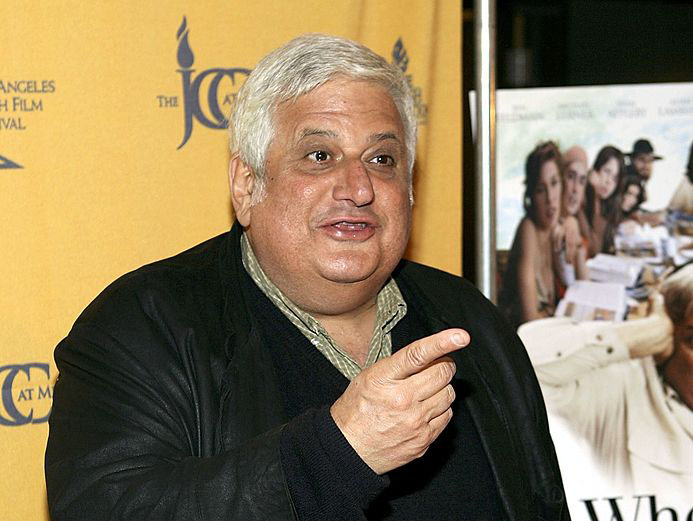At the age of 14, with $500 saved up from bussing tables, Fred Leeds bought a 1965 Mustang. A couple of months later, he sold it for $900.
“It ruined my life,” he quipped, eliciting booming laughter from his wife, Dina Leeds.
“That’s what put him through college,” she said.
Fred Leeds continued: “I figured, if I can make ‘X’ amount of dollars buying and selling a car, how much can I make buying a building?”
The search for an answer led to Fred Leeds Properties, for which Fred and Dina are now president and vice president, respectively. The company, which opened its doors nearly 30 years ago, is made up of 165 employees and manages approximately 5,000 apartments and 2 million square feet of retail space across Los Angeles, Arizona and New York.
Born seas apart, the Leeds’ pasts share little in common. Fred is a West Los Angeles native, raised by a single mother and the product of a blue-collar upbringing. Dina and her family settled in the United States after fleeing their native Cairo along with hundreds of thousands of fellow Egyptian Jews when she was just 2 years old, following 1967’s Six-Day War.
Dina and Fred actually lived mere blocks away from each other when Fred’s mother, already a friend of Dina’s, introduced the pair. “He was known as the most eligible bachelor in the neighborhood,” Dina said of her husband.
These days, the couple shares a thriving business, a home and seven children, ranging in age from 10 to 30. They also share a core belief that with success in the business world comes a duty to lead outside of it, as well.
Despite calling West Los Angeles home and owning property all over the city, just over a year ago the Leeds moved their company offices from Sepulveda Boulevard on the Westside to a new facility in the heart of South Central Los Angeles on Crenshaw Boulevard. They manage many properties in the surrounding area, a neighborhood often associated with poverty and gang violence.
So why set up shop there? Fred answered while sitting in his office, where the wall is lined with towering portraits of U.S. Presidents George Washington and Andrew Jackson — men he describes as “great leaders.”
“We’re actively involved in this area and in this community,” he said. “We feel that there’s a tremendous amount of opportunity here. We get to offer something here that you can’t offer on the Westside of Los Angeles — that’s affordable housing.”
His dedication to the community and underserved groups has earned him several awards from the city, as well as organizations such as the Boys and Girls Club.
The couple said that one of the company’s fundamental tenets is getting involved in mismanaged properties, buying them inexpensively and turning them around. Philosophically, its management policy boils down to two items: over-improve and under-rent, essentially upgrading units and renting them slightly under market value. The aim is to surround residents with “good neighbors” and build up the community. They also hire several local building managers who know the communities and are invested in their prosperity.
According to Dina, development in South Central started out as an opportunity and over time evolved into a call to action.
“In our business, we don’t have tenants; we have residents. There are full lives being lived there. These are where children will have their memories,” she said. “It’s a matter of doing the best with what you’re doing. We had an opportunity to buy buildings in these areas. It was an opportunity initially. Once we got in there, we realized there was a need in the community and we tried to figure out how to best serve the community.”
Outside of their business, the Leedses are involved in numerous philanthropic endeavors spanning the gamut of culture, civic engagement, education and Israel. Just this past August, they took three of their children to Baton Rouge, La., to volunteer for the American Red Cross and assist in disaster relief efforts for those affected by flooding. Dina said their drive to give back comes from an immense appreciation of what they have.
“We live in constant gratitude,” she said. “There but for the grace of God go I. For whatever reason, we’ve been fortunate enough to be in the position that we’re in. We tell our children that there’s a responsibility with it. For me, it’s giving a voice to the voiceless.”
Dina serves on the board for the Los Angeles Ballet, supporting programs that bring company dancers to underserved neighborhoods. She also serves on the board for the Builders of Jewish Education. There her primary interest is ensuring any child who wishes to receive a Jewish education is able to — a cause that resonates with her own immigrant narrative.
“Tuition has gone crazy,” she said. “It really shouldn’t be a pick-or-choose situation to see who has the right to a Jewish education. As immigrants, we know what it’s like. We came to this country as traditional Jews from Egypt. For my father, it was very important that we have a Jewish education, although we never could’ve afforded this type of tuition we’re seeing.”
The Leedses serve together as national board members for StandWithUs and, perhaps most visibly, for American Friends of Magen David Adom (AFMDA). Dina is also the president of AFMDA’s Western Region. They’re fresh off co-chairing AMFDA’s annual Red Star Ball, which was held Nov. 1 at the Beverly Hilton and raised more than $14 million for Israel’s emergency medical service and blood bank.
The former vice president of Friends of the Israel Defense Forces (FIDF) Western Region, Dina turned her attention to AMFDA a few years ago partly because unlike the Israel Defense Forces, Magen David Adom isn’t an Israeli government agency — though it is the lone organization mandated by the Israeli government to function in its role and therefore relies on fundraising efforts.
“I see this as a critical infrastructure that gives life, that saves lives,” Dina said. “When you talk about lifesaving, when you talk about every single ambulance in Israel, when you talk about the entire blood supply of the entire country, and when you talk about that being at risk, you realize that lifesaving efforts are truly in our hands.”
Fred said the “first spark” in getting involved to give back was to lead by example for their children.
Clearly, the rest of the family has been paying attention. Consider that in 2012, one of their sons, Robert, used his bar mitzvah proceeds — about $250,000 — to donate two ambulances to Ashkelon in southern Israel.
“I’ve watched my son grow up with values that he’s learned from being around our charitable work and attending schools like Yavneh Hebrew Academy and YULA,” Fred said. “It has given him a foundation, a strong foundation in life, that has made him a leader, and gives him sensitivity to his environment, to his community and has him making a difference every day.”
The Leedses brought one of Robert’s ambulances to YULA before it was shipped off to Israel. There it was on display for the entire student body. A few short years later, that very same ambulance was on the scene in Israel helping to save the life of an IDF solider bleeding from a stab wound.
“When Robert did it, it was a thought, an idea: ‘Let my bar mitzvah project be — I want to raise money for an ambulance in Israel.’ I don’t think he realized at the time all the various things that would come about from it,” Dina said.
Since she knows that most people can’t raise $250,000, Dina’s advice is simple: Start small.
“The thing I would tell anyone, especially any youth, is just put one foot in front of the other,” she said. “The Torah will tell you, ‘Open for me an opening like the eye of a needle and in turn I will enlarge it to be an opening through which wagons can enter.’ It comes out to: Put a foot in the right direction and doors will open. If anything we do affects any one person doing just one thing, then we’ve accomplished something.”





















 More news and opinions than at a Shabbat dinner, right in your inbox.
More news and opinions than at a Shabbat dinner, right in your inbox.